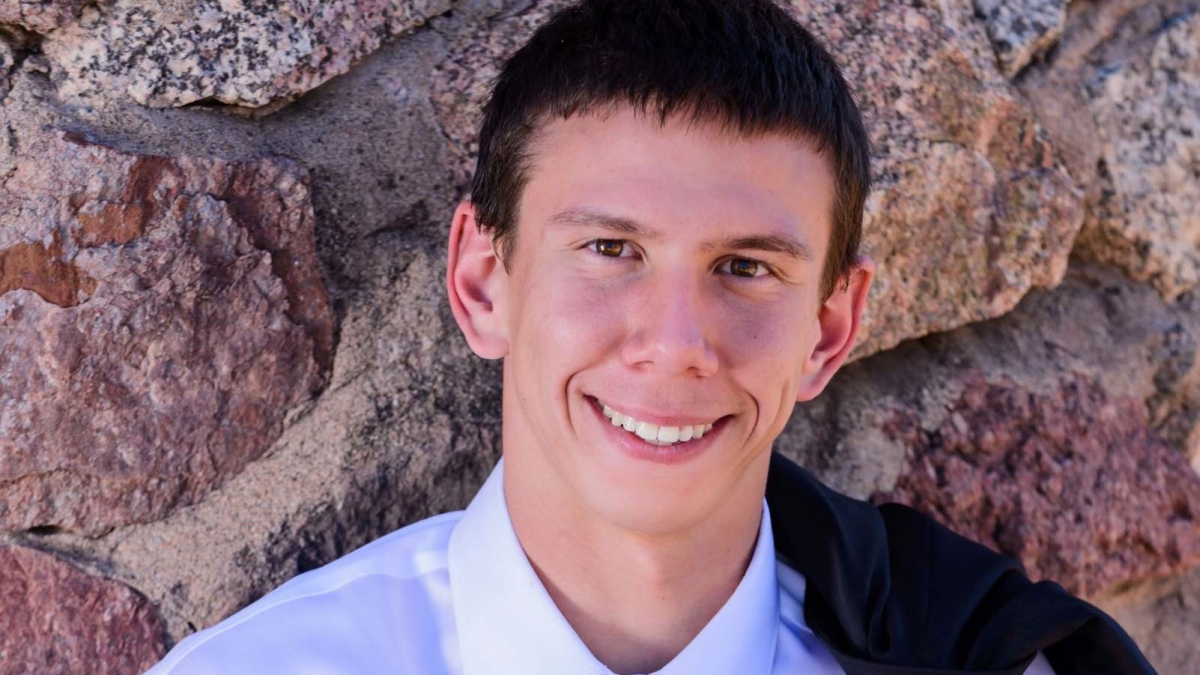One day, years ago, Patrick and Teri Caserta checked the lunch money account they had set up for their son, Brandon, at his elementary school.
They were surprised to see the account had far less money than they thought it should. So, they questioned Brandon about it.
“We asked him if he was eating two lunches or anything like that,” Teri Caserta said. “He said he wasn’t, but that he noticed kids that didn’t bring a lunch or didn’t have a lunch, and he would buy them lunch. And he asked if that was OK, or if he should stop.
“We’re like, ‘No, you do what you want to. You just have to let us know that you’re using it so we can fund it.’”
That legacy of giving and helping others is one reason the Casertas have started an annual scholarship at Arizona State University’s College of Health Solutions in honor of Brandon, who died by suicide on June 25, 2018, while he was a member of the Navy.
Video by Ken Fagan/ASU News
The Brandon Caserta Memorial Scholarship, worth $1,000 annually, will go to a student in the College of Health Solutions who has a demonstrated interest in the military, said Paola Gale, assistant director of development for the college with the ASU Foundation. It’s also the first scholarship open to any student in the College of Health Solutions.
“That’s significant,” Gale said. “We might have a student looking at medical studies or another field and see that there’s no scholarship for that program. Our scholarship coordinator was delighted that this is really the first scholarship that is open to all (College of Health Solutions) students.”
The $1,000 scholarship is only the beginning. Patrick Caserta said they are donating one-third of their estate to ASU after their death, an amount significant enough that it will pay for a four-year education for several students.
“Their estate gift to fund the Brandon Caserta Memorial Scholarship, the first scholarship at the College of Health Solutions that is open to any of our majors, along with supporting active military and veteran health initiatives at (the college), will make a difference for many years to come,” said Deborah Helitzer, dean of the College of Health Solutions. “The Casertas' gift will allow (College of Health Solutions) students, faculty and staff to continue and expand on our current efforts in support of better health for our nation’s military and veterans.”
Patrick Caserta said he and Teri decided to contribute a portion of their estate in part because he was a student in the College of Health Solutions from 2009 to 2014.
“I always wanted to give back more than I have,” Patrick said. “I liked going to school there a lot. It was very enjoyable. It was rough, don’t get me wrong. There were times I was upset because it was hard. But the professors that I dealt with were awesome.
“The other thing is, unfortunately, we don’t have anybody to really leave anything to. So it made all the sense in the world.”
Ask the Casertas about Brandon and they’ll tell you he was the “kindest, nicest person you’ll ever meet,” a boy who loved Legos and an athlete who excelled in karate and swimming and played football at Liberty High School in Peoria.
“He wasn’t like me. I’m a little rough around the edges,” Patrick Caserta said. “I’m not going to tell you everybody liked him immediately, but he’d grow on them. He just liked people.”
Patrick Caserta said Brandon’s desire to help others followed him to the Navy. If he finished his work, he’d help others do their work and then ask for more. But Patrick said Brandon was bullied, harassed and hazed while serving with the Helicopter Sea Combat Squadron 28 in Norfolk, Virginia, where he was transferred after he collapsed during Navy SEAL training.
His suicide prompted the Casertas to contact U.S. Sen. Mark Kelly and U.S. Rep. Seth Moulton, who subsequently wrote the Brandon Act, which went into law in December of 2021. The Brandon Act is designed to protect service members who experience mental health emergencies and reduce the stigma around reporting. The bill allows service members to seek mental health treatment and requires a mental health evaluation as soon as a service member self-reports.
In addition, Patrick and Teri created the Brandon Caserta Foundation, whose mission is to provide assistance, guidance, education and resources to active-duty service members, veterans and their families.
As it turns out, that’s what Brandon was doing in the final days and weeks of his life. When the Casertas got Brandon’s cellphone back after his suicide, they checked his text messages and discovered he was counseling and helping other members of the Navy who were struggling with their mental health.
“We feel his legacy was saving lives,” Patrick said. “That's what the Brandon Act is about and that's how we want to preserve his legacy, with our foundation and the scholarship.”
Learn more about how to apply for the scholarship on ScholarshipUniverse, or donate to the scholarship fund on the ASU Foundation website.
More Health and medicine

The surprising role of gut infection in Alzheimer’s disease
Arizona State University and Banner Alzheimer’s Institute researchers, along with their collaborators, have discovered a surprising link between a chronic gut infection caused by a common virus and…

ASU, University of Wisconsin partner to empower Black people to quit smoking
Arizona State University faculty at the College of Health Solutions are teaming up with the University of Wisconsin to determine which treatments work best to empower Black people to quit…

New book highlights physician wellness, burnout solutions
Health care professionals dedicate their lives to helping others, but the personal toll of their work often remains hidden.A new book, "Physician Wellness and Resilience: Narrative Prompts to Address…
